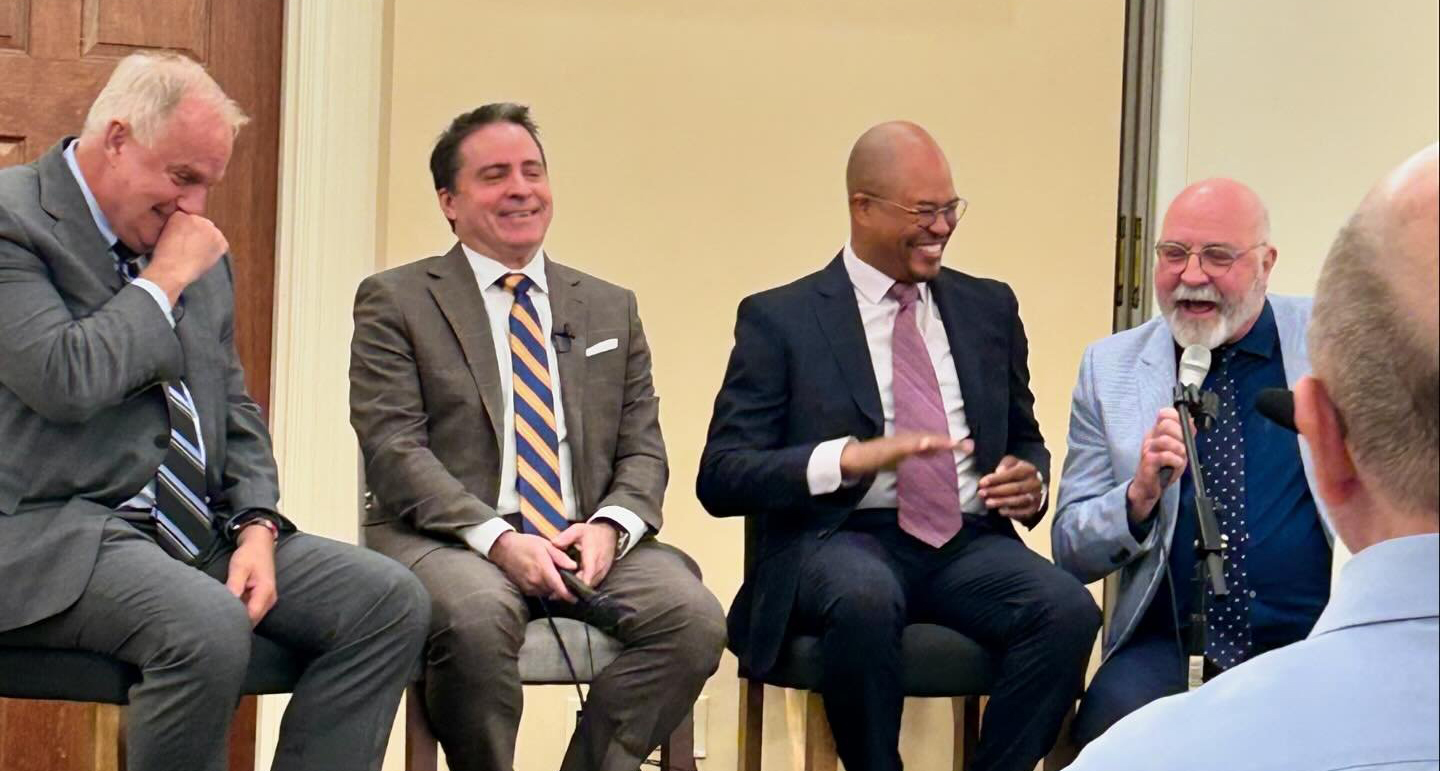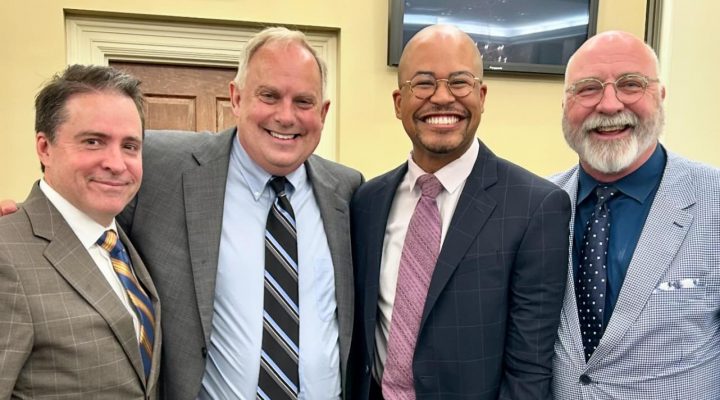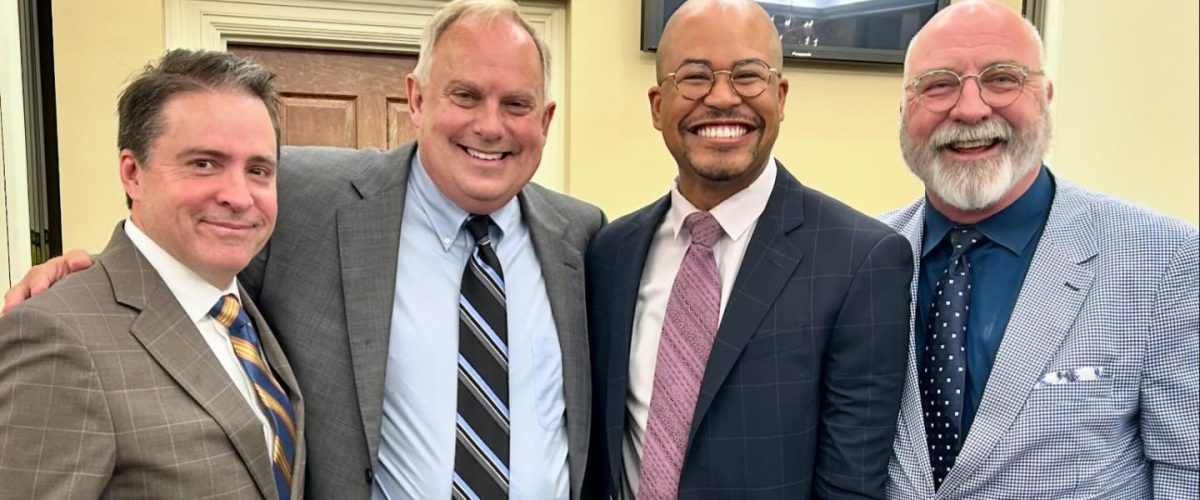The popular view that the United States is split in half on cultural, religious and political values is a fallacy propagated by the evangelical-controlled Republican Party, according to Robert P. Jones, president of Public Religion Research Institute.
“Two-thirds of the country is embracing a pluralistic, diverse democracy with freedom of religion, but there is a very loud and committed minority in the country that is trying to hold us back from that vision,” Jones said April 14 during Baptist News Global’s first live-audience webinar.
White evangelicals make up only 13.4% of the U.S. population and 17% of Texas residents, Jones explained during the discussion hosted at Wilshire Baptist Church in Dallas.
“But because that one group has so loaded itself into one of our two political parties, it acts like a megaphone. So, they go from 13.4% of Americans to about one-third of Republicans and then leverage that platform to sound like 50% of Americans.”
“Because that one group has so loaded itself into one of our two political parties, it acts like a megaphone.”
Joining Jones in the conversation were Greg Garrett, professor of English at Baylor University, Wilshire Senior Pastor Timothy Peoples and BNG Executive Director Mark Wingfield. The webinar culminated a weekend of conversation at Wilshire on the roots of racism and Christianity.
1776, 1619 or 1493?
Recognizing and repairing the root causes of racial and religious injustice requires looking beyond current events and polling to pivotal moments that even preceded the nation’s officially recognized founding in 1776, Jones said.

Robert Jones
Rather than starting the story in 1776, The New York Times’ 1619 Project connected the nation’s origins to the year in which the first group of enslaved Africans were imported and sold to English colonists in Virginia.
“By the time we get to 1619, we often forget there is more than a century of European interaction with indigenous people in this country,” Jones explained.
But the country’s true origin story must go back at least to 1493, when Pope Alexander VI issued a decree granting European explorers legal and theological authority to seize the lands of North America and enslave indigenous people because they were not Christians.
That means “we have to tell not only a different story about America, but a different story about Christianity,” Jones said.
That decree and others helped the European conquerors rationalize behavior that went against gospel values, Garrett added. “If you’re going to take people into perpetual slavery or chattel slavery, you have to come up with a justification for that if you’re going to sleep at night.”
But papal documents weren’t enough. “So, what they began doing was to create myths about the continent of Africa and about the people who live there,” he continued.
Tracing the history that led to the white supremacy ingrained in the nation’s founding is more than an intellectual or academic exercise, Garrett said. Author and civil rights activist James Baldwin “insisted on knowing your history — knowing it, acknowledging it — and then you can begin to repair it.”
“If you don’t acknowledge your history, or if you deny your history, it doesn’t need fixing. You just cruise on down the highway being happy and white.”
Thus, modern-day efforts to prevent teaching America’s racial history “makes perfect sense,” he said. “If you don’t acknowledge your history, or if you deny your history, it doesn’t need fixing. You just cruise on down the highway being happy and white.”
The danger of being ‘chosen’
Wingfield pointed to God calling out the children of Israel in the Bible as his chosen people and asked if the feeling of chosenness is just part of being human.

Greg Garrett
It seems to be, Garrett said. “But what’s damaging is when we take that ‘us and them’ and we say our ‘us’ is better than your ‘us,’ and we can treat your ‘us’ anyway that we want to because we’re better for whatever reason we create for ourselves.”
Jones said the concept of being “chosen people” might be the most dangerous biblical concept unleashed on the world.
“Just think about all the mischief that has been done in the name of being chosen. The entire colonial project gets off the ground because of this idea in the Torah. It is white Europeans who are chosen by God, and all the other lands in the world are for their use and exploitation.”
Yet white colonizers believed they were being generous, not exploitative, Jones said. “Yes, we’re taking their goods, we’re taking their land, we’re enslaving them. But look what they get. It’s a deal. What they get is the genius of European civilization and Christianity. That balances the scales.”
But the enslaved never really received either of those supposed benefits because they were not granted citizenship or full recognition as Christians, Peoples noted. “They only get a half piece of Christianity because they’re not allowed to get baptized.”
‘The Bible I was taught’
Detecting the racism inherent in some American understandings of faith and Scripture can be challenging because those views are ingrained in American culture, said Jones, who was raised Southern Baptist in the Deep South.
“The Bible that I was taught, those verses that I memorized, gave me virtually no leverage on thinking about racial justice issues,” he said.
Enslavers in the U.S. believed slavery was justified by Scripture and were confident their interpretation was correct, he added. “They could cite chapter and verse, and the abolitionists were having to make the more abstract arguments about equality and love and imago Dei. They were having to make a theological argument while the enslavers were quoting chapter and verse.”
For example, the 19th century Slave Bible, printed in England, was designed to keep slaves unaware of scriptural passages about freedom and equality.
“It has the book of Exodus, whose very name means liberation, right. It has the enslavement of the Israelites, but not their freedom. It has ‘slaves obey your masters’ from Ephesians, but it does not have Galatians, ‘in Christ there is neither slave nor free, neither Jew nor Greek.’”
Leaving a racist church
A consequence of the continuous extolling of such attitudes, especially in the flare-up of Christian nationalism in recent years, is that young people are leaving the church, Garrett said.
“They are driven away, many of them, because of the conservative Christian stances on race and on LGBTQ issues. They don’t know that it’s possible to love Jesus and love everybody else. And it’s our job to speak back into that vacuum. We’ve got to tell our truths and not be silent.”

Timothy Peoples
Peoples asked how it is that white Christians can become enmeshed in white Christian nationalism without seeing it is a white supremacist movement.
Garrett cited the longevity of the ideology, adding that he saw a political poster in France recently that urged French citizens to “save our civilization.”
“Robert said that whenever you see that phrase — ‘our civilization,’ or ‘our country,’ or ‘our nation’ — it is a white supremacist tell. And every time you see that, they are excluding everybody who doesn’t fit.”
Other terms are especially tied to the American context of white Christian nationalism, Jones said, including “manifest destiny” and reference to the nation as “a city on a hill.”
“This is an explicit claim to European chosenness to these lands because of the superiority of European civilization and the Christian religion. It is the version of Christianity that landed on these shores prior to the nation ever coming into being.”
Hierarchies of power
Wingfield asked how debates around other issues, like gender equality, immigration and science-versus-faith, are connected to the surge of ideology of white Christian nationalism.
“White people who are reacting to the many changes that are taking place in our culture do not want to give up their ability to be the masters of the universe.”
“The lowest common denominator for all of these is about preserving our power and our culture for our people,” Garrett replied. “White people who are reacting to the many changes that are taking place in our culture do not want to give up their ability to be the masters of the universe.”
Peoples said he has encountered that resistance firsthand. In high school, some teachers called him the N-word, and he watched how Black women were stereotyped as “welfare queens,” he said. Such stories are untrue, but the myth is perpetuated to keep building the structure of white Christian nationalism, he said.
White Christian nationalists have a hierarchal worldview in which every person and issue has its proper place, Jones explained. “It’s men over women, It’s white over non-white. … Non-straight people aren’t even on the map anywhere. But there is that sense that like there was this fixed order and God wanted white, straight men at the top of it. And everybody else is sort of somewhere else down the pyramid depending on different characteristics they have.”

Greg Garrett, Robert Jones, Timothy Peoples and Mark Wingfield
Who should tell this story?
Peoples added that he received criticism over the weekend for hosting two white men — Garrett and Jones — to talk about racism.
Influenced by the examples of Martin Luther King Jr. and activist Cornel West, Peoples responded that people of color do not bear the responsibility for fighting racism: “We’re not the ones who are racist in this situation.”
Garrett said he became an active proponent of anti-racism work after theologian Kelly Brown Douglas informed him she did not need an ally in fighting for racial justice. “She said, ‘This is not my problem, Greg. I didn’t create this problem. You did. And you and people like you are going to have to solve it.’”
Christian nationalism not growing
As the webinar drew to a close, Wingfield asked Jones where he sees any hope amid the rise of white Christian nationalism.
Jones pointed to the stagnating acceptance of Christian nationalism detected in PRRI and Brookings Institution polling over the past two years.
“It’s not growing. It remains about three in 10 Americans that are sympathetic to white Christian nationalism or adhere to white Christian nationalism tenets. These are things like U.S. laws should be based on the Bible and that America should declare itself a Christian nation.”
Jones said he also sees hope in most Americans’ support for an array of social justice issues.
“Two-thirds of Americans say abortion should be legal in all or most cases. It’s only about one-third of Americans, and only one religious group — white evangelical Protestants — for whom a majority oppose the legality (of abortion).”
Approval of LGBTQ marriage rights also is strong among most Americans, he said. “Nearly seven in 10 Americans today support marriage equality in the country. Again, it’s only about three in 10 that are opposed, and it’s only one group in the country.”
Immigration enjoys a similar level of support, he said. “If you ask about a path to citizenship right for immigrants who are in the country undocumented, it’s six in 10 Americans that say we should provide a path to citizenship for those people who are here.”
Wingfield responded: “That’s the dose of sunshine we needed right now.”
Related articles:
PRRI survey connects where people worship to their views on climate change
New survey: Republicans and white evangelicals are outliers in fear of immigrants invading U.S.
Most Americans believe democracy is at risk in 2024 — but for different reasons


